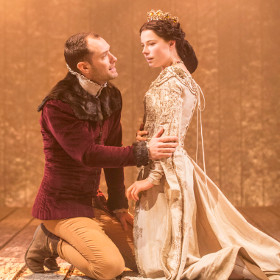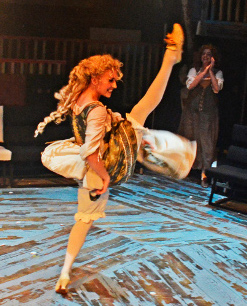Michael Coveney: Jude lays down the Law, while Scarlett hardly blushes in Candide
I remember a colleague once saying that Toby Stephens played Coriolanus very well as Henry V. I'm sure Tom Hiddleston won't make the same mistake when he plays the same role soon at the Donmar Warehouse, especially as he's already played Henry V in the recent television Shakespeare series.

© Johan Persson
Hiddleston was a rather posh Henry V, too, whereas Jude Law, who opened last night at the Noel Coward, is a more workaday sort of monarch, with the edges knocked off, keen to get down and dirty with the lads on the battlefield and playing the wooing of Jessie Buckley's delightful French princess with a sort of faux roguishness, nothing like Hiddleston's polite awkwardness.
Michael Grandage's production has at least restored my faith in the possibility of Shakespeare surviving on the proscenium stage, when most of the best Shakespeare these days is done in the round, on a thrust, in your face or in the car park. His Midsummer Night's (hippie dippy) Dream seemed to me cribbed and confined on the Noel Coward stage, whereas Christopher Oram's simple stockade design this time allows the play to breathe and reach out more. And the battle scenes are well done in a series of short, sharp brush strokes of choreography.
You could argue that the French court is a bit of a throwback – their costumes look suspiciously like curtain material from Debenhams – and this must be the first Henry V where we have to take the insulting French gift of tennis balls totally for granted; you're more likely to see the stage flooded with the bouncy blighters than not these days. And the rhetoric of the battle cries is addressed directly to the men, not the upper circle. There's very nearly as much prose as verse in this play, and Jude is pleasingly adept at making the one sound as natural as the other.
In fact, there are times when you feel his Henry V is verging on the brink of becoming a very good Hamlet, or at least a better one than he played for Grandage in his Donmar era a few years ago. That angry performance seemed to me a bit one dimensional and a bit too sulky all the way through. This Henry has strength and vitality as well as an audience-buttoning way with the more introspective speeches, especially the great meditation on kingship, commoners and relative responsibilities.
Grandage's masterstroke is the casting of the young boy in the play as the Chorus, so that the extremely well-spoken Ashley Zhangazha is both inside and outside of the play with, as it happens, disastrous and very dramatic consequences.
Good to see RSC associate Noma Dumezweni showing up well (and, again, speaking notably well) as both Mistress Quickly and the princess's English language tutor. And Ron Cook is a wonderful Pistol – funny, ridiculous and set fair on a life of petty crime once he gets back home to Eastcheap.
One big question might be: is Jude just a little old for the role? I reckon he's just made it. At least he hasn't had to hang around the throne room for as long as poor old Prince Charles, and he's still bugged by doubts about how his father Bolingbroke came by the top job, with good reason.
Richard Burton made his name as a Stratford Henry V, and there were similar breakthrough performances on that same stage by Kenneth Branagh and Michael Sheen, while Alan Howard – who played just about every Shakespeare king going in the 1970s and 1980s – projected a particularly memorable monarch in black leather and a special relationship with his spotlight.
I'm still buzzing a bit from Monday night's Candide opening. By sheer coincidence at lunchtime yesterday I heard a live performance on BBC Radio 3 of the overture by the BBC Philharmonic in Salford; it made me realise how very clever are Jason Carr's orchestrations, which approximate to the intricacy and the lushness of the full score and hint throughout at the cross rhythms and, well, cross pollinations of the various numbers.

© Nobby Clark
I also feel I haven't done sufficient justice so far to Matthew White's unbridled, improvisatory production, an ideal way of dealing with the picaresque adventures and what one reviewer has already identified as the Monty Python side of things in the show. I loved Jonathan Miller's sombre "Age of Enlightenment" setting for his Scottish Opera version, which came to the Old Vic, with some satirical re-writes by John Wells. And I loved John Caird's NT revival with Simon Russell Beale, Denis Quilley, Clive Rowe and Beverly Klein so much that I actually paid good money to go back and see it again, something I rarely do.
Scarlett Strallen handles the great “Glitter and be Gay” number far more successfully than she handled the “Music and the Mirror” set piece in A Chorus Line earlier this year, but the songs are not directly comparable: the first is a vocal challenge, the second a more difficult dance and dramatic one, and while she burned up the Palladium stage alright, she didn't set fire to the roof.
But I think that was not so much her fault as the failure of the revival to make any of the dancers' stories – with the notable exception of leggy Leigh Zimmerman's – germane to the tensions and atmosphere of the overall situation. At the Menier Chocolate Factory, Scarlett’s "turn" is an expression of the whole show's colourful, throwaway properties.
And talking of properties, what about those red woolly sheep in the Montevideo mountains? One of these cuddly creatures nearly landed in one of the laps of the two critical Dominics – Cavendish and Maxwell – sitting in front of me, one a mere commoner, the other a belted earl. And if the sheep had been Jude's tennis balls, he really would have been. Belted, I mean.












